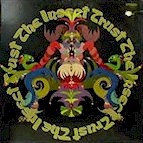
Genre: psych
Rating: **** (4 stars)
Title: The Insect Trust
Company: Capitol
Catalog:
Year: 1968
Country/State: US
Grade (cover/record): VG-/VG
Comments: rough edges and corners; bullet hole; gatefold sleeve
Available: 1
GEMM Catalog ID: not yet listed
Price: $50.00
As The Insect Trust, guitarists Bill Barth and Luke Faust, reed players Trevor Koelhler and Robert Palmer and vocalist/keyboard player Nancy
Jeffries were among the most eclectic of late-1960s bands. Even though they were one of the era's weirder outfits and attracted little attention (and even fewer sales), their out-and-out experimentation had a substantial impact on
music and if you're willing to make the investment of time and energy,
getting into their short catalog can be a rewarding experience.
Having previously played in The Solip Singers (along with Holy Modal Rounder Pete Stampfel), by 1968 Barth and Jeffries had moved on to form The Insect Trust (the name reportedly inspired by Bill Lebvy's poetry
journal The Insect Trust Gazette). In the process they somehow scored a contract with Capitol Records (legend has it that while at a party, hearing a particularly crappy piece of music on the
stereo Barth told a fellow guest he hated the song - the fellow guest happened to
be Steve Duboff who had produced it).
Produced by Duboff, the band's self-titled 1968 debut offered up an impossible to describe aural grab bag of influences. With all five members contributing material
"The Insect Trust" somehow managed to incorporate influences ranging from
1920s-era anti-war tracts ('World War I Song'), bluegrass ('Foggy River Bridge
Fly'), C&W, jazz,
discordant avant garde (the second half of 'The Skin Game'), blues (the blazing
'Special Rider Blues') and what would even pass as a precursor to today's world music genre
('Going Home'). Propelled by Jeffries'
crystalline voice and the band's penchant for unusual instrumentation and bizarre
arrangements (often within the same song), to my ears the results were simply fascinating. Personal favorites; the mesmerizing
'Miss Fun City' and the sweet ballad 'Been Here and Gone So Soon'. Clearly too unusual for radio (to say nothing of the rank and file listening public), the album instantly landed in cutout bins.
"The Insect Trust" track listing:
(side 1)
1.) The Skin Game (Bill Barth - Nancy Jeffries - Robert Palmer - Trevor Koehler) - 4:07
2.) Miss Fun City (Bill Barth - Nancy Jeffries - Robert Palmer) - 5:04
3.) World War I Song (J. Callicott) - 3:18
4.) Special Rider Blues (J. Nehemiah) - 7:45
5.) Foggy River Bridge Fly (instrumental) (Trevor Koehler) - 1:07
6.) Been Here and Gone So Soon (Bill Barth - Nancy Jeffries - Robert Palmer)
- 3:29
(side 2)
1.) Declaration of Independence (Robert Palmer) - 2:30
2.) Walking On Nails
3.) Brighter Than Day (Bill Barth - Nancy Jeffries - Robert Palmer - Trevor Koehler) - 2:31
4.) Mountain Song (Bill Barth - Nancy Jeffries - Robert Palmer - Trevor Koehler - Luke Faust) - 2:49
5.) Going Home (Bill Barth - Nancy Jeffries) - 5:10
